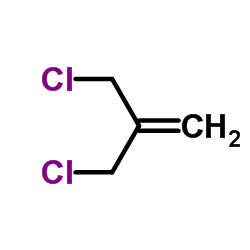1,1-bis(trichlorosilylmethyl)ethylene
Modify Date: 2024-01-04 17:32:25

1,1-bis(trichlorosilylmethyl)ethylene structure
|
Common Name | 1,1-bis(trichlorosilylmethyl)ethylene | ||
|---|---|---|---|---|
| CAS Number | 78948-04-6 | Molecular Weight | 322.97900 | |
| Density | 1.4 g/mL at 25ºC(lit.) | Boiling Point | 128-131ºC16 mm Hg(lit.) | |
| Molecular Formula | C4H6Cl6Si2 | Melting Point | N/A | |
| MSDS | N/A | Flash Point | 178 °F | |
| Name | trichloro-[2-(trichlorosilylmethyl)prop-2-enyl]silane |
|---|---|
| Synonym | More Synonyms |
| Density | 1.4 g/mL at 25ºC(lit.) |
|---|---|
| Boiling Point | 128-131ºC16 mm Hg(lit.) |
| Molecular Formula | C4H6Cl6Si2 |
| Molecular Weight | 322.97900 |
| Flash Point | 178 °F |
| Exact Mass | 319.81400 |
| LogP | 4.85320 |
| Index of Refraction | n20/D 1.488(lit.) |
Synonym:(2-Methylene-1,3-propanediyl)bis(trichlorosilan Section 2 - COMPOSITION, INFORMATION ON INGREDIENTS
Risk Phrases: 14 34 Section 3 - HAZARDS IDENTIFICATION EMERGENCY OVERVIEW
Reacts violently with water. Causes burns. Potential Health Effects Eye: Causes eye burns. Skin: Causes skin burns. Ingestion: Causes gastrointestinal tract burns. The toxicological properties of this substance have not been fully investigated. Inhalation: Causes chemical burns to the respiratory tract. The toxicological properties of this substance have not been fully investigated. Chronic: Not available. Section 4 - FIRST AID MEASURES Eyes: Immediately flush eyes with plenty of water for at least 15 minutes, occasionally lifting the upper and lower eyelids. Get medical aid immediately. Skin: Get medical aid immediately. Immediately flush skin with plenty of water for at least 15 minutes while removing contaminated clothing and shoes. Ingestion: Do not induce vomiting. If victim is conscious and alert, give 2-4 cupfuls of milk or water. Get medical aid immediately. Inhalation: Remove from exposure and move to fresh air immediately. If not breathing, give artificial respiration. If breathing is difficult, give oxygen. Get medical aid. Notes to Physician: Section 5 - FIRE FIGHTING MEASURES General Information: As in any fire, wear a self-contained breathing apparatus in pressure-demand, MSHA/NIOSH (approved or equivalent), and full protective gear. Water Reactive. Material will react with water and may release a flammable and/or toxic gas. Combustible liquid. Extinguishing Media: Use foam, dry chemical, or carbon dioxide. DO NOT USE WATER! Section 6 - ACCIDENTAL RELEASE MEASURES General Information: Use proper personal protective equipment as indicated in Section 8. Spills/Leaks: Absorb spill with inert material (e.g. vermiculite, sand or earth), then place in suitable container. Section 7 - HANDLING and STORAGE Handling: Do not breathe dust, vapor, mist, or gas. Do not get in eyes, on skin, or on clothing. Storage: Keep away from sources of ignition. Store in a cool, dry place. Store in a tightly closed container. Corrosives area. Store under an inert atmosphere. Section 8 - EXPOSURE CONTROLS, PERSONAL PROTECTION Engineering Controls: Use adequate ventilation to keep airborne concentrations low. Exposure Limits CAS# 78948-04-6: Personal Protective Equipment Eyes: Not available. Skin: Wear appropriate protective gloves to prevent skin exposure. Clothing: Wear appropriate protective clothing to prevent skin exposure. Respirators: Follow the OSHA respirator regulations found in 29 CFR 1910.134 or European Standard EN 149. Use a NIOSH/MSHA or European Standard EN 149 approved respirator if exposure limits are exceeded or if irritation or other symptoms are experienced. Section 9 - PHYSICAL AND CHEMICAL PROPERTIES Physical State: Liquid Color: light yellow Odor: acrid odor pH: Not available. Vapor Pressure: Not available. Viscosity: Not available. Boiling Point: 240 - 242 deg C @ 7 Freezing/Melting Point: Not available. Autoignition Temperature: Not available. Flash Point: 81 deg C ( 177.80 deg F) Explosion Limits, lower: Not available. Explosion Limits, upper: Not available. Decomposition Temperature: Solubility in water: reacts with water Specific Gravity/Density: 1.4100g/cm3 Molecular Formula: Cl3SiCH2C(CH2)CH2SiCl3 Molecular Weight: 322.98 Section 10 - STABILITY AND REACTIVITY Chemical Stability: Stable under normal temperatures and pressures. Conditions to Avoid: Incompatible materials, exposure to moist air or water. Incompatibilities with Other Materials: Oxidizing agents, acids, bases, alcohols, amines. Hazardous Decomposition Products: Hydrogen chloride, carbon monoxide, carbon dioxide, silicon dioxide. Hazardous Polymerization: Has not been reported Section 11 - TOXICOLOGICAL INFORMATION RTECS#: CAS# 78948-04-6 unlisted. LD50/LC50: Not available. Carcinogenicity: 1,1-Bis(trichlorosilylmethyl)ethylene - Not listed by ACGIH, IARC, or NTP. Section 12 - ECOLOGICAL INFORMATION Section 13 - DISPOSAL CONSIDERATIONS Dispose of in a manner consistent with federal, state, and local regulations. Section 14 - TRANSPORT INFORMATION IATA No information available. IMO No information available. RID/ADR No information available. Section 15 - REGULATORY INFORMATION European/International Regulations European Labeling in Accordance with EC Directives Hazard Symbols: C Risk Phrases: R 14 Reacts violently with water. R 34 Causes burns. Safety Phrases: S 8 Keep container dry. S 25 Avoid contact with eyes. S 36/37/39 Wear suitable protective clothing, gloves and eye/face protection. S 45 In case of accident or if you feel unwell, seek medical advice immediately (show the label where possible). WGK (Water Danger/Protection) CAS# 78948-04-6: No information available. Canada None of the chemicals in this product are listed on the DSL/NDSL list. CAS# 78948-04-6 is not listed on Canada's Ingredient Disclosure List. US FEDERAL TSCA CAS# 78948-04-6 is not listed on the TSCA inventory. It is for research and development use only. SECTION 16 - ADDITIONAL INFORMATION N/A |
| Hazard Codes | C: Corrosive; |
|---|---|
| Risk Phrases | 14-34 |
| Safety Phrases | 26-27-36/37/39-45 |
| RIDADR | UN 2987 8/PG 2 |
| WGK Germany | 3 |
|
~87% 
1,1-bis(trichlo... CAS#:78948-04-6 |
| Literature: Mayr, Herbert; Gabriel, Andreas O.; Schumacher, Ralf Liebigs Annalen, 1995 , # 9 p. 1583 - 1586 |
| 1,1-BIS(TRICHLOROSILYLMETHYL)ETHYLENE |
| 3-Trichlorsilyl-2-(trichlorsilyl-methyl)-propen |
| 1,5-Disilapentane,1,1,1,5,5,5-hexachloro-3-methylene-(6CI) |
| 3-trichlorosilanyl-2-(trichlorosilanyl-methyl)-propene |
| 3-(Trichlorosilyl)-2-<(trichlorosilyl)methyl>-1-propene |
| MFCD00239510 |
